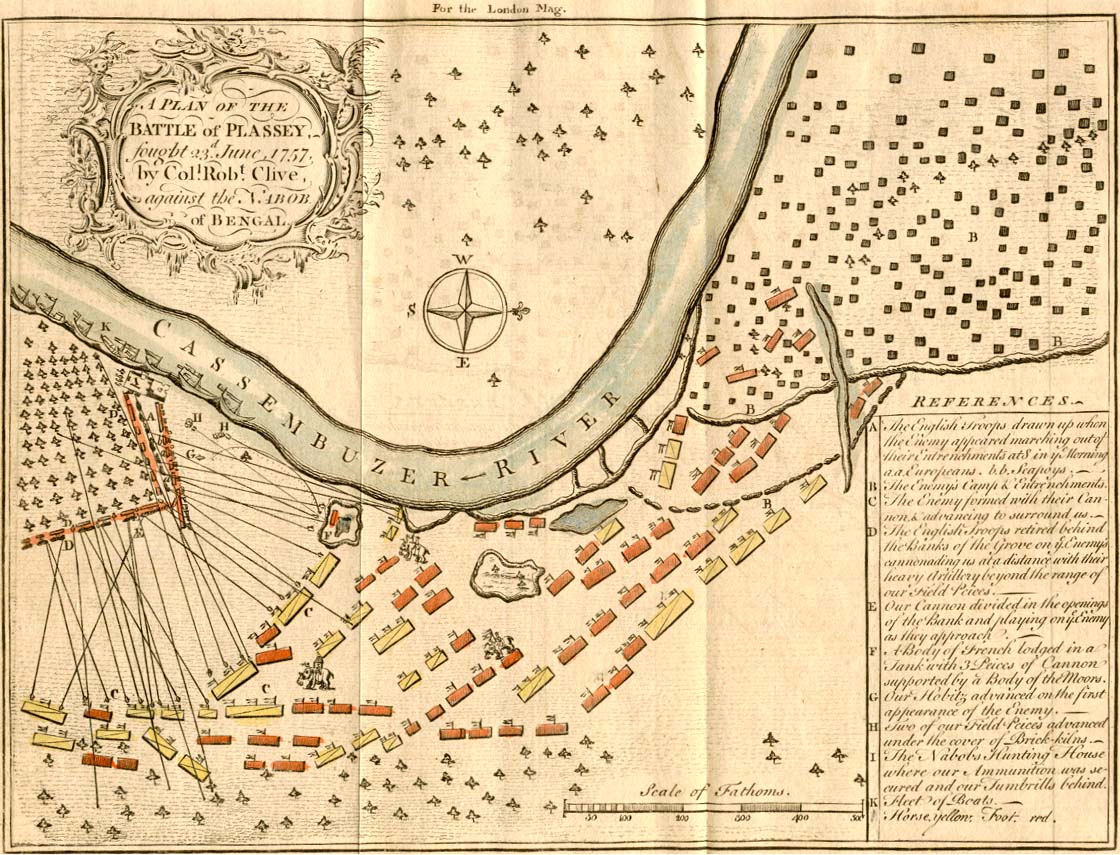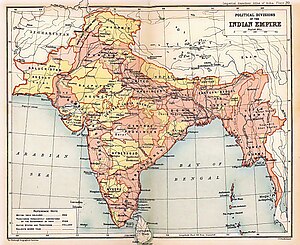Plassey
If France suddenly decided it should become a
monarchy once again, and were to search for a Bourbon to take the crown, last
worn more than one and a half centuries
back, the search team may have to fly down to Bhopal, capital of the Indian
state of Madhya Pradesh, infamous for the Union Carbide gas tragedy.

The
coat of arms adopted by the Bhopal Bourbons
For the only surviving Bourbons live there, in a palatial
house which proudly has engraved above its main door, the French royal fleur-de-lis, flanked by two Indian elephants. Their
ancestor - Jean-Philippe de Bourbon - arrived in 1560 at the court of Emperor
Akbar after various adventures on the way including being kidnapped by pirates.
The young 16th century royal was from an elder branch of France’s ruling
family and had to flee his home after a duel gone wrong.
It was a time when many a young European out to make
a fortune, would turn to India – which in their eyes was the `Golden Bird’. As the Mughal Empire crumbled, the Bird once elusive and ruled by haughty
princes became vulnerable. Mughal subalterns in various provinces, each the
size of a major European nation or larger, continued to pay homage to the
Imperial Throne at Delhi, but ruled in their own way, more often at loggerheads,
than in alliance with each other.
Europeans traders backed by their Monarchs, had
initially set up Mughal sanctioned portside factories. But with the ebbing of
Mughal power, they gradually gained greater influence by controlling more and more land
and sizable armies which were often lent out to short-sighted warring princes
to settle matters in a manner ultimately favourable to the outsider. In the
words of one Urdu humourist, “they (Europeans) were granted firman
(grant) for as much land as could be covered by a tent. Little did the Emperor
know that their tent was made of stretchable rubber.”
The Europeans were also fighting their own battles
on the cold continent and this was carried to the high seas and to the tiny
bits of India they controlled. In mid-18th
century Bengal, then ruled by a young and impetuous Mughal lieutenant, Nawab Siraj-ud-Dowlah,
both the French and English fortified their trading posts against each other.
Siraj demanded these fortifications be dismantled. The
French complied. However, the English did not heed Siraj's warnings. An angry Nawab then ordered a successful punitive raid to bring the rebel English post on the river Hooghly, Calcutta, to its knees. Fort St George, the headquarters of the `Honourable Company', sent Robert Clive, a young Englishman who had come out as a clerk to find his fortune in India, and had risen to be a celebrated young General in the company’s army in Madras, to win back Calcutta.
Clive as versed in the ways of war as in intrigue, bided his time after landing in Bengal. Emissaries were sent to win friends with the many noblemen and tycoons who had grudges against Siraj, or had ambitions to the gaddi (Subaltern throne) themselves, before the Madras force ultimately advanced towards Murshidabad, the capital of Bengal.

Only an advance force under two Brigade commanders, Mir Madan and Mohanlal, remained true to the hapless Siraj. Even their tiny combined forces were enough to make Clive retreat early in the battle. However soon after, Madan fell to a stray shot, while Mohanlal was forced to retreat on repeated orders of Jaffer, just as he was on the cusp of victory.
To his horror, the young ruler, Siraj, saw his army dissolving as a
disgusted Mohanlal left the battlefield. An Indian chronicler of that time,
Ghulam Hussain, says “Siraj … fearing not only the English in his front, but
chiefly the domestic enemies about his person, lost all firmness of mind …
(and) joined the runaways himself.” Only to be caught and condemned to a fate
of blinding and eventual death.
Jaffar, became the next Nawab (Governor). But the
Company, became the real rulers of Bengal with its untold riches. Jaffar in
turn was pensioned off to be replaced by his ambitious son-in-law, Mir Qasim,
who chaffing under the English tutelage, attempted a short-lived revolt, only
to be replaced by old Jaffer once gain.The Battle of Plassey was, in the words of eminent historian R.C.Majumdar: “hardly more than a skirmish but its result was more important than that of many of the greatest battles of the world.” True, for it opened the way for the conquest of India, the brightest jewel in England’s crown, by the employees of arguably the world’s first successful transnational corporation. The revenues of the rich province of Bengal, funded the conquest of India. The money, which the sub-continent earned for the English in turn helped fund the establishment of that island nation's global Empire `Over Which The Sun Never Sets.'
In another sense, Plassey was not about military defeat but rather the defeat of an antiquated feudal order up against a new European order welded by the ideas of a New Age, of an India which had started crumbling into blind sub-states, which could not see reason to unite against a common enemy. In a manner it was also the story of when the Idea of India faltered.

A Map of the British Empire in India
(portions shown in pink are British ruled, yellow ruled by Indian Princes)
4 comments:
I find your historical narrative fairly illuminative and enlightening.Even the so-called intelligentia would be unaware of the salient features of our glorious past. You should continue this laudable effort.
Fantastic, Jayanto. Past is something we have to keep digging into - indidivually. Keep up this effort. Cheers
An exceedingly well written piece. Maps could have been bigger and more legible.
Have missed the earlier parts.
This one is very good. The Bourbons of Bhopal..... very interesting.
Post a Comment